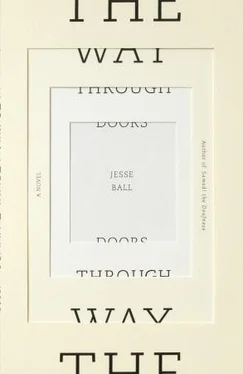Jesse Ball
The Way Through Doors
and it doesn’t matter, it doesn’t mean what we think it does
for we two will never lie there
we shall not be there when death reaches out his sparkling hands
— Kenneth Patchen, “And What with the Blunders”
 oung man, let me look at you.
oung man, let me look at you.
The room was broad, and lit from behind by massive windows that lined the dark mahogany-paneled wall. Light came through in a vague haze, sifted just beyond the glass by the leaves of the oaks from the street. A large man, my uncle, came around the desk towards me.
I, smiling, nodding, trying to look agreeable. My uncle fatter than he had been. But happy. Fat and happy. That’s the way. An important man in the governing of the city, my uncle had always been far too busy to bother with such as me.
— My boy, you seem well. Not too long, coming down here on the train? There was an accident just yesterday. Someone got pushed.
The way he said it made it sound like the city was a sort of theatrical production.
— Not long, I said quietly. I had my book.
I held up a book. It was a book of letters that desperate Russian poets had sent to an old German poet and he to them during a summer near the beginning of the century. My uncle did not look down at the book, but came around it and slapped me on the back.
— Good, good, he said. (An embrace.)
— You’ve had your hair cut, haven’t you? he asked. Cut with a straight razor, looks like.
— Yes, I said, just now. I do it myself, a couple times a year.
— You use a mirror? he asked.
— No, I said, just a razor and a comb. In fact, I close my eyes.
— Not bad, he said. It’s the old way, isn’t it? Way they used to do it…I’d like to see that. Tell me next time, and I’ll send the car.
He gave me another pat, then unhanded me, went back around the desk, and sat down with the air of a man who has often sat down in the presence of others who remain standing.
— I have given your situation some thought, Selah. I understand there was this business in C., and I know it distracted you for a while, but god damn it, man, you’ve got to get yourself together. These scraps of paper…
He held up several of my pamphlets. I sat up straight.
— It just won’t do you any good. No conceivable good.
— I…
— Enough of that, he said. I have conferred with some old friends and I am going to install you in a position of which I feel you are certainly capable. There is a man I know, Levkin. He’s an odd man, but trustworthy. I think you can gain much from his acquaintance.
He pressed a button behind his desk, and a door on the far side of the room opened. A man came out. He had evidently been waiting there some time, but he gave no sign of it. Nodding to my uncle, he immediately addressed me.
— Selah Morse?
I nodded. A strange-looking man. He was the sort you could never recall anything about afterwards. Featureless. Not that he didn’t have features. He was of a certain height, of a certain weight, etc., but they didn’t add up to anything. He was more of an average weight, an average height. If he left the room, who would remember him?
— This way, please.
He looked at me as I stood there, book in hand.
My uncle nodded.
— I think you’ll find the work pleasant. Come see me in a week or so. We’ll lunch together. I know a place….
But already I was following the featureless man through the paneling and down a set of stairs.
At the bottom of the stairs there was a passage that let out onto the street. I tried to place it in my memory in case I ever needed to get up to my uncle’s office on the quick. In my head I imagined an enormous house, a mansion I had visited once as a boy. I walked in the front door, along the central hallway. On the right was a room made expressly for telephoning. I entered it, pulled tight the door. Beside the telephone on the nightstand, I placed the idea of this secret entranceway to my uncle’s office. Quietly then I exit first the telephone-room, then the mansion, shutting carefully the doors.
— Call me Levkin, the man said shortly.
I nodded. There was no need to say my name.
I followed Levkin down the block. He had a rapid way of walking with hardly any wasted motion. He turned several times, finally coming to a sort of pocket-park. In the center, a building. We crossed the park, mounted the steps, and entered, he turning in the lock a sort of monkey-faced key.
Within there was a large room. A desk stood opposite the door. On it a girl lay sleeping. She was quite slender, and expensively dressed. She gave one the impression of a cat, insomuch as were one to wake her it seemed she would only stalk off to some other equally unlikely napping place, there to resume her slumber.
I looked at Levkin. He had his finger over his lips. Softly he said:
— That’s Rita, the message-girl.
— Messages for what? I whispered.
— The Seventh Ministry. Municipal Inspection.
He passed on through a left-hand door into a long sort of sitting room. There were tables, chairs, and sofas, as well as a large armoire. He opened it. Inside were a great number of identical suits in various sizes. Identical to the suit he himself was wearing. It was an elegant suit, obviously costly, but very quiet.
— Size? he said.
I reached past him and took the appropriate suit.
— Your office is this way, he said.
We exited the sitting room and proceeded back past Rita, who was now awake and watching us with one of two eyes. I said nothing; she said nothing.
— In here, said Levkin.
Through the right-hand door we went. A hallway led to the back of the house. There was a ladder on one side and a stair on the other. Levkin climbed up the ladder. I followed. At the top, a landing and a door. He opened the door.
— Your office. On the desk, a letter in explanation. Rita may or may not be up soon with your tea.
Levkin did a sort of half bow, and vanished back through the door and down the ladder, leaving me to survey my new premises. It was a fine room. A very long window ran much of the way along the wall, giving a view out onto the park. A dog was chasing another dog, which was chasing the first dog unsuccessfully. I felt that this meant something. I wrote it down on a pad of paper.
Dog chasing dog itself chasing dog, but not fast enough.
I illustrated the note, took a tack, and pinned it to the wall beside my desk. As I did this, Rita entered and leaned against the wall.
— Dressing up the place? she asked.
— Is that my tea? I asked.
— It can be.
She crossed the room and set the tea down on a small table by the window. With a sigh she threw herself down into a large leather chair and sat watching me.
I shook my head. I picked the suit up, went into the bathroom, and changed into it, slowly and carefully. The experience was enormously pleasing. Never had I been in possession of such a fine suit. It fit perfectly. Pants, shirt, vest. There was even a pocket watch.
Rita entered the room.
— Not bad, she said, and held the suit coat up for me.
I slid it on.
— Milk and sugar, I said. Or, just honey. If you’re going to do something, you might as well…
— I’ll write that down somewhere and lose it, she said. The suit fits. Not bad. I imagine you don’t know a thing about what goes on here, do you?
— I know enough, I retorted.
— We’ll see, she said. If you know anything at all, then why do we keep all our clocks three hours ahead?
Читать дальше

 oung man, let me look at you.
oung man, let me look at you.










